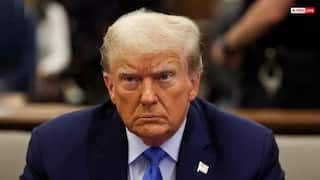‘Unilateral Trade Policies Violate Principles Of Equity’: Developing Countries At COP29
India said restrictive unilateral measures force developing and low-income nations to bear the costs of transitioning to low-carbon economies.

New Delhi: Developing countries strongly opposed unilateral trade measures disguised as climate actions at the COP29 climate talks on Friday, calling them "discriminatory" and harmful to global cooperation.
They argued these measures violate the principles of equity and common but differentiated responsibilities (CBDR).
China, on behalf of the BASIC group of countries, submitted a proposal to the UN climate body last month requesting that this year's climate talks address the issue of unilateral trade measures such as the European Union's Carbon Border Adjustment Mechanism (CBAM).
Although the proposal did not make it to the formal agenda even after a prolonged debate on the first day of the summit, COP29 President Mukhtar Babayev announced consultations on the issue, with outcomes to be shared at the conference's conclusion.
Making an intervention in the presidential consultations on Friday, India said this is a matter of global concern that needs urgent consideration to ensure the development pathways of developing countries are not constricted.
Other groups of developing countries, including the G77, the largest bloc representing over 130 nations at the UN climate talks, and Like-Minded Developing Countries also registered their strong opposition on the issue.
However, developed countries, particularly the European Union, argued that the United Nations Framework Convention on Climate Change (UNFCCC) is not the right platform to discuss this issue, as it is already being addressed by the World Trade Organization (WTO).
India said restrictive unilateral measures force developing and low-income nations to bear the costs of transitioning to low-carbon economies, undermining climate finance commitments from developed nations, which have historically benefitted from industrialisation and contributed the most to greenhouse gas emissions.
"They effectively will result in the reversal of climate finance mobilised by the developed countries. It is like asking the victim to pay for the remedy," it said.
"Any unilateral measures in the name of climate change responses are discriminatory towards developing countries and detrimental to multilateral cooperation. They violate principles of equity and CBDR-RC and the UNFCCC provisions," it said.
India further said unilateral trade measures discriminate against countries seeking to industrialise through export-led growth by raising the cost of goods.
If the goal is to reduce global carbon emissions, climate policies must focus on offering concessional finance and building the capacity of countries to address both mitigation and adaptation, it said.
Bolivia, on behalf of the LMDCs, said this is a matter of critical importance for global equity, fairness, sustainability and international cooperation.
"While unilateral trade measures claim to address climate change, these are in reality exacerbating inequality and placing an undue burden on developing economies," the Bolivian negotiator said.
"For decades, developed countries have reaped the benefits of industrialisation at the expense of the global environment and impact on climate change. Meanwhile, developing countries have been striving to build equitable economies, achieve sustainable development, alleviate poverty, and improve the quality of life for their people.
"These measures can shift the responsibility for climate action disproportionately onto those who bear the least historical responsibility for global warming, further entrenching inequalities between developed and developing nations," the Latin American country said.
Experts argue that trade policies tied to climate action must be discussed in inclusive forums like the UNFCCC, rather than being left to trade bodies like the WTO.
Trishant Dev, programme officer for climate change at Delhi-based think tank Centre for Science and Environment (CSE), said if climate-related issues are beginning to inform trade policies, it is crucial to create space for multilateral discussions on these measures.
"The WTO is not equipped to address CBDR yet. The UNFCCC is grounded in the principles of equity and CBDR, and its original text already cautions against unilateral actions that may negatively impact developing countries. Therefore, it is well placed to initiate this discussion on climate-related trade policies as other multilateral fora catch up," he said.
One of the unilateral trade measures that developing countries have been strongly resisting is CBAM -- the EU's proposed tax on energy-intensive products, such as iron, steel, cement, fertilisers, and aluminium, imported from countries like India and China.
The tax is based on carbon emissions generated during the production of these goods. Both the United Kingdom and the United States are at different stages of imposing their versions of this mechanism in due course.
The EU has earlier argued that this mechanism creates a level playing field for domestically manufactured goods, which must adhere to stricter environmental standards, and help curb emissions from imports.
Finance Minister Nirmala Sitharaman last month termed CBAM "unilateral and arbitrary" and said such measures could potentially harm India's industries and disrupt the balance in international trade.
According to CSE, CBAM will impose an additional 25 per cent tax on carbon-intensive goods exported from India to the EU. This tax burden would represent 0.05 per cent of India's GDP.
(This report has been published as part of an auto-generated syndicate wire feed. Apart from the headline, no editing has been done in the copy by ABP Live.)
Related Video
Punjab News: AAP Leader Shot Dead During Wedding in Amritsar




































